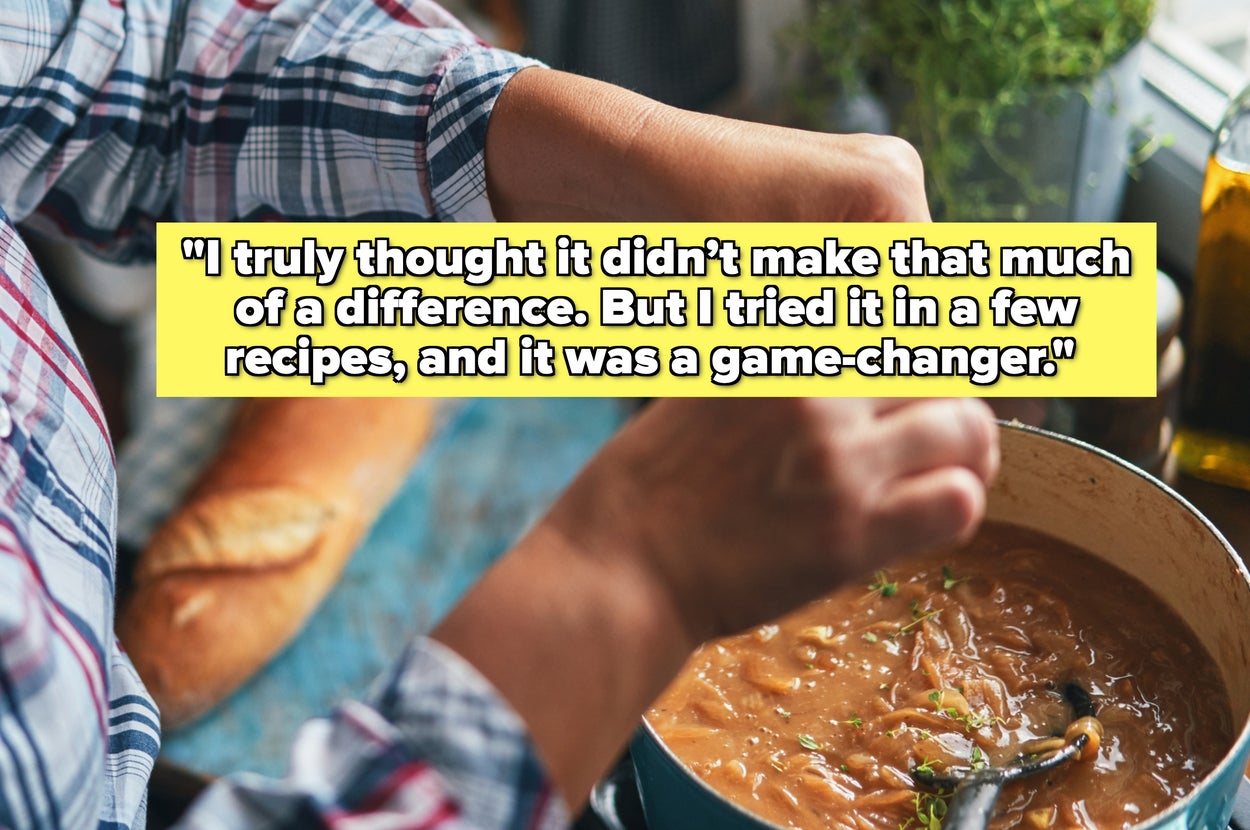
1.
“I was astounded when my friend suggested lemon juice for an overly salty stew. It works somehow! I’m sure the food still has near-dangerous levels of salt, but it tasted perfect.”
2.
“My trick for caramelizing onions is to do it in the slow cooker. I put them on low and let them go overnight. I always make a huge batch and freeze the leftovers so I always have them on hand.”
3.
“After 20 years of making from-scratch frosting with soft cream cheese or butter and powdered sugar, I have discovered that brown sugar with cream cheese and butter is way better tasting, and most variations of different sugars and dairy fat combinations work for different flavors or textures.”
4.
“Searing/sauteeing in a single layer. Don’t overcrowd your pan because all it does is steam your food instead of searing it.”
5.
“Using knives that are actually sharp. I’m not saying that you need to go out and buy anything wildly expensive either; just invest some time in really learning how to sharpen them yourself. I felt like it made the prep process a lot easier, quicker, and frankly safer.”
6.
“Don’t sleep on nutmeg! It’s such an underutilized spice, especially in savory cooking. My grandfather would add it to meat, like pork, veal, lamb, and even beef. When you’re done cooking, it ends up being a warm, light flavor underneath whatever else you’ve added.”
7.
“You can cook bacon on a rack right in the oven. AND you can double the amount of bacon you can fit if you twist them into spirals (helix, lengthways). They’re more fun to eat this way, too.”
8.
“Stop worrying about being ‘authentic’ or ‘correct’ and just throw in whatever ingredients sound good and/or you need to finish. One of my favourite recipes came about because I was making chicken adobo and ran out of vinegar, so I used hot sauce instead.”
9.
“Cook rice in stock rather than water, but go above and beyond by gently toasting your rice in a little butter and olive oil before adding your stock for extra flavor!”
10.
“Salt, sugar, and acid work like a flavor triangle. If it’s too salty, add some acid. If it’s too sour, add something sweet. If it’s too sweet, add something salty. When the flavors balance, you have a great tasting dish.”
11.
“If the thing you’re cooking doesn’t taste as good as you want it to, and it doesn’t need more salt, fat, herbs, aromatics, or spices, the answer is always that it needs more acidity. Add some citrus, vinegar, or other acidic ingredients like tomato for savory recipes.”
12.
“Learning to properly tenderize meat. Look up how to ‘velvet’ chicken, and you no longer have to worry about stringy woody or tough meat. Add a little baking soda, and you can use cheap cuts for things like casseroles and stir fry! We never mess with takeout anymore.”
13.
“Listen to your food. You can actually hear a change in the sound of the sizzle when something has been properly seared and releases from the pan.”
14.
“The importance of making some things a day before serving, like potato salad. My friends did an informal chili cookoff, and I swear the main reason I won was that I cooked it the day before and reheated it. It had some depth and maturity; the freshly made chilis didn’t. I have an odd work schedule and was the only person who didn’t have the day off the day of the party, so I cooked the day before. I didn’t do that to win, but my chili was way deeper than the rest because of it. What’s my secret? I made it yesterday.”
15.
“For me, it was fresh herbs. I truly thought it didn’t make that much of a difference. Tried them once on a few recipes (dill on eggs Benedict, sage/rosemary/thyme on chicken roast) and it was a complete game changer. I still use dried herbs and spices all the time, but fresh definitely makes things better, in my opinion.”
16.
“Cook pasta until it’s almost done, drain and mix with sauce, then rest. The last bit of moisture it needs to finish is pulled from the sauce and adds flavor.”
17.
“How to properly roast vegetables. I grew up in a house where all the veggies were steamed, and that was it. They tasted plain and often mushy. I thought I just hated veggies until I got married and started cooking. I now roast almost all my veggies, and it’s so simple. Baking sheet, olive/avocado oil, salt, pepper, maybe some garlic or herbs, but you can easily get away with just salt and pepper, and it’s still great. Shake that tray around to coat, 425°F for 12 minutes. No more bland broccoli, and no more saggy asparagus.”
18.
“Braising! It’s nice to be able to grab a cheaper roast on sale and know that I can turn it into a tender, delicious dish. It’s also a ridiculously forgiving technique. Don’t have time or energy? Combine everything in a Dutch oven, add some stock, and let it braise until whatever you threw in has turned tasty.”
19.
“I was watching this old cooking show (I think it was Julia Child or someone similar) and she mentioned salting pasta water until it ‘tastes like the sea.’ Always thought that was just fancy talk, but decided to try it. Wow, the difference is incredible. The pasta actually has flavor instead of being this bland base that just soaks up sauce.”
Do you have something to add? What is a cooking tip, technique, or hack that changed everything for you in the kitchen? Tell us in the comments or in this anonymous form.






